UNICEF’s Chief, Enugu Field Office, Mrs Juliet Chiluwe, said this at a virtual media dialogue with journalists in Owerri, on Saturday, to mark the year 2025 World Immunisation Week.
Speaking on this year’s theme: “Immunisation For All Is Humanly Possible”, Chiluwe described vaccines as “one of humanity’s greatest achievements”.
She called for increased advocacy, communication, social mobilisation and cold chain support to achieve routine immunisation that “would really reach everyone”.
Chiluwe also called for infrastructure strengthening such as the establishment of oxygen gas plants to strengthen health systems in states with the greater need.
“This year’s theme reaffirms the feasibility and necessity of protecting everyone from newborns to the elderly, against vaccine-preventable diseases, through inclusive and equitable Immunisation services.
“Vaccines remain and over the last 50 years, essential vaccines have saved at least 154 million lives, that is, six lives a minute, every day, for five decades.
“UNICEF, therefore, joins efforts with health care providers and governments to promote the values of immunisation services as should, which entails getting to the last mile,” she said.
Chiluwe commended the contributions from state governments that compliment UNICEF’s efforts and urged them not to relent in their partnership.
She further urged them to build momentum on progress made so far by continuing to provide budgetary allocations to ensure that every eligible child gets lifesaving vaccines to survive and reach their full potentials.
Director-General, Broadcasting Corporation of Abia State, Mr Francis Nwanbani, and UNICEF’s implementing partner, said that it was necessary to ensure that the successes of the past five decades were replicated going forward.
This, he said, would help to achieve the “humanly possible” campaign.
“ We must endeavour to reach more children with essential immunisations while developing new and newer vaccines to cover a broader range of diseases and ages,” he said.
The News Agency of Nigeria (NAN) reports that lectures at the dialogue focused on sustainable vaccine development and immunisation strategies especially for children. (NAN)










